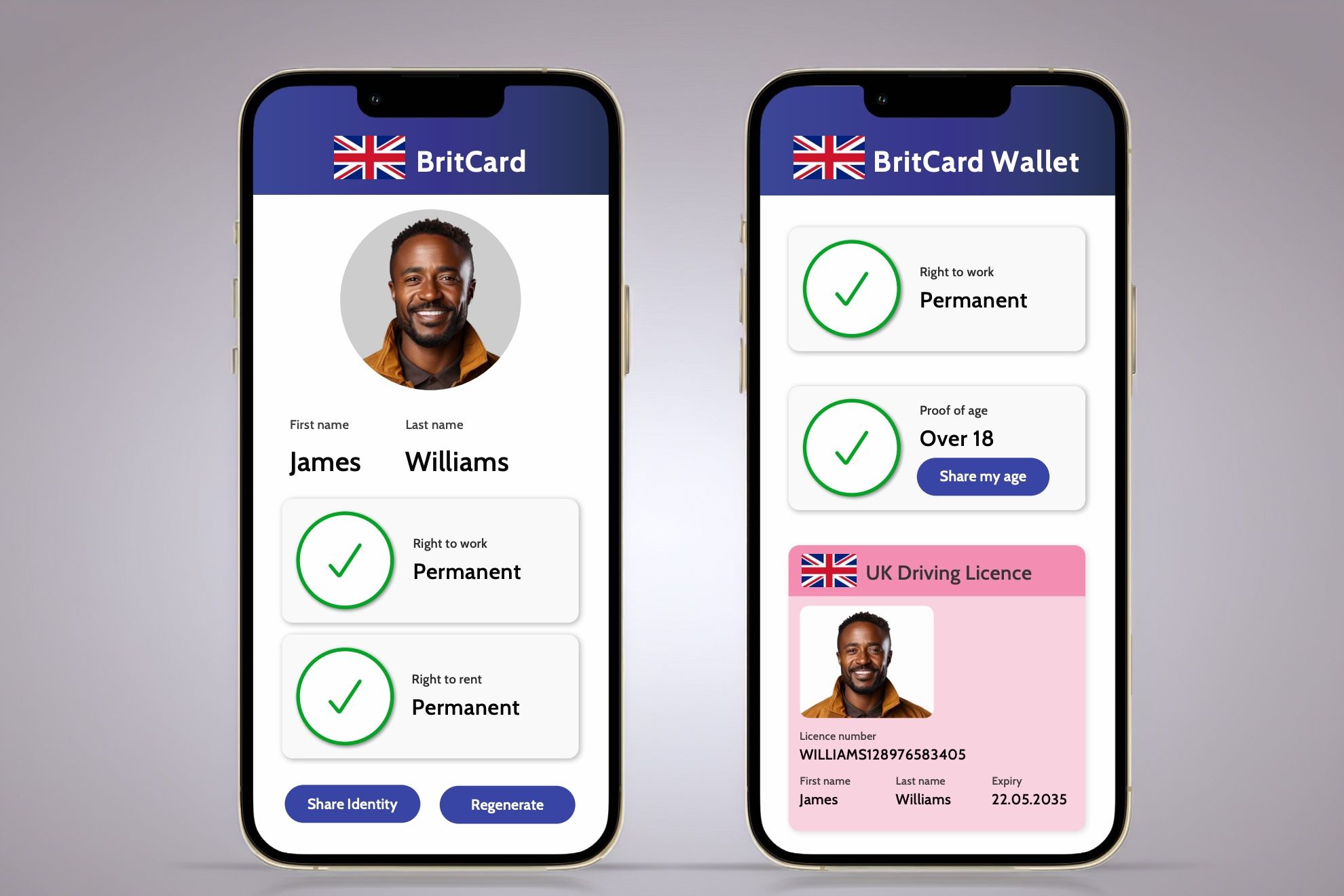Key facts (as of September 28, 2025)
- What’s being introduced: The UK government plans a mandatory, state‑issued digital ID (“BritCard”) that will be required for Right to Work checks by the end of the current Parliament (expected 2029). It will live in a GOV.UK digital wallet app and is pitched as free to residents. Gov
- Who must have it:All working‑age adults will effectively need the digital ID to get or keep a job once employer checks rely on it. Officials say people won’t be required to carry it routinely; non‑smartphone options are expected. Gov
- Government’s rationale: Ministers argue BritCard will curb illegal working, strengthen border security, and make it easier to access services (e.g., driving licences, childcare, tax). Gov
- Data & design (what we know): Early briefings and reporting indicate the ID would contain name, date of birth, residency status and a photo and be verified via a smartphone wallet; detailed architecture and safeguards are to follow a consultation. The Guardian
- Backlash: A fast‑growing petition surpassed 1.6 million signatures on Sept. 27 (some live reports put it higher) amid civil‑liberties and cybersecurity concerns. The Guardian
- Political headwinds: Opposition parties (Conservatives, Lib Dems, Reform UK) and Northern Ireland’s first minister have attacked the plan; critics say it won’t stop cash‑in‑hand illegal work and could breach rights. Reuters
- Expert warnings: Cybersecurity professor Alan Woodward cautions a national digital ID could be “an enormous hacking target.” The Guardian
- The history lesson: A Labour‑era ID card scheme launched in the 2000s was scrapped by the 2010 coalition; the National Identity Register was destroyed in 2011. Gov
- International context: The EU will require every member state to offer an EU Digital Identity (EUDI) Wallet by end‑2026; Estonia and Denmark already run mature digital‑ID systems; India’s Aadhaar covers 1.4+ billion residents; U.S. mobile driver’s licenses are now accepted at 250+ TSA checkpoints. TSA
The in‑depth report
What exactly is “BritCard”?
Downing Street announced a national digital ID to be mandatory for Right to Work (RtW) checks by the end of this Parliament. The government says a BritCard credential would sit in a GOV.UK wallet on a person’s phone, similar in feel to the NHS App or contactless payments, with a promise of free enrollment. A formal explainer pledges convenience for citizens and a phased expansion to public‑service access; RtW is slated as the first mandated use‑case. Gov
The vision reported so far: a credential that employers, banks, landlords and public bodies can verify digitally—replacing manual ID photocopies and utility‑bill checks. The Guardian’s early reporting ties BritCard to a GOV.UK Wallet approach that can be scanned/validated by relying parties using standard software. Final details, including offline/alternative channels for those without smartphones, are still subject to consultation; AP reporting says the scheme will be accessible without a smartphone. The Guardian
Why now?
The move is framed as part of a broader immigration and labour‑market enforcement strategy: make it harder to work illegally, reduce the “shadow economy” and, politically, answer voter concerns about small‑boat crossings. Reuters’ briefings indicate the ID could later streamline access to childcare, welfare and tax records—folding identity into more digital journeys. Reuters
Prime Minister Keir Starmer calls digital ID “an enormous opportunity” that would tighten RtW checks and “make our borders more secure.” The Guardian
The backlash—in numbers and arguments
Public resistance has been rapid. A petition against digital IDs cleared 1.6 million signatures on Sept. 27, with some live blogs citing 1.8 million+ by Sept. 28. Petitioners say “no one should be forced” into a state‑controlled ID system—a “step towards mass surveillance.” The Guardian
Civil‑liberties group Big Brother Watch argues a mandatory digital ID would “turn us into a checkpoint society” and be “wholly unBritish.” Director Silkie Carlo urged ministers to drop the proposal and focus on targeted enforcement. Big Brother Watch
Security experts warn about concentration risk. Prof. Alan Woodward cautions that a national digital ID could become “an enormous hacking target,” especially if contractors and integrators create complex dependency chains. The Guardian
Politically, the attacks cut across parties. Reform UK derided the plan: “It’s laughable that those already breaking immigration law will suddenly comply.” In Northern Ireland, first minister Michelle O’Neill called the proposal “ludicrous and ill‑thought‑out,” raising cross‑border rights concerns for Irish citizens—the Good Friday Agreement angle ministers will have to address. Reuters
On the opinion pages, the Telegraph’s Daniel Hannan argued ID cards are always sold as the answer to whatever is bothering voters, warning scope‑creep and state overreach. Yahoo
What data would it hold and how would it be protected?
Based on current reporting, a BritCard credential would include name, date of birth, residency status and a photo. The government says it will use strong encryption and GOV.UK One Login/wallet building blocks, but has yet to publish full technical specifications, governance and breach‑response plans. Experts will look for data minimisation, verifiable credentials with selective disclosure, and a robust legal perimeter covering when, where and by whom the ID may be demanded. The Guardian
Not starting from zero: the UK already digitised RtW checks
Since 2022, employers can use certified Identity Service Providers (IDSPs) and ID document validation for Right to Work/Right to Rent/DBS—a foundation BritCard would centralise and standardise at the state level. Guidance under the UK Digital Identity and Attributes Trust Framework set out certification and audit for those private services; BritCard would effectively replace or subsume today’s patchwork with a single, state‑issued credential. Gov
The politics and the law: what must happen next?
To go from announcement to reality, primary legislation and detailed secondary regulations will be required, plus procurement for wallets, verification tools and onboarding. Ministers say—and critics note—that mandating RtW use creates a powerful network effect; once employers must check the state credential, most working‑age adults will need one. A consultation process is promised before draft law. Gov
How does BritCard compare internationally?
European Union (EUDI Wallet)
The EU has legislated an EU Digital Identity Wallet under eIDAS 2.0, and says “Member States will make wallets available to every citizen, resident and business by the end of 2026.” The EU approach emphasises selective disclosure and cross‑border interoperability across public and private services. European Commission
Estonia (e‑ID)
Estonia’s state infrastructure has long offered chip‑based ID, mobile‑ID and digital signatures across nearly all government services, banking and healthcare—functionality built over two decades and supported by strong public‑key infrastructure. Adoption is near‑universal. The UK’s stated inspirations include Estonia’s model, but BritCard starts with a narrower RtW use‑case. RIA
Denmark (MitID)
Denmark’s MitID is a mature digital ID used for online banking, taxes and health. Like Estonia, it shows the administrative gains of one trusted login—but Denmark has paired this with digital inclusion programs for people without smartphones or high digital literacy. MitID
India (Aadhaar)
Aadhaar is the world’s largest digital identity system, now covering 1.42+ billion residents, and used for benefits payments and KYC. It delivers scale and convenience but continues to face hard questions on privacy, data quality and use‑limitations. The contrast is instructive: Aadhaar is a unique ID number with broad linkage; the UK proposes a work‑checks credential first. UIDAI
United States (mobile driver’s licenses, mDL)
The U.S. runs state‑level digital IDs rather than a federal ID. TSA now accepts mDLs at 250+ checkpoints, and Apple/Google Wallet integrations are expanding, but there is no national mandate. The U.S. experience shows how opt‑in wallets can gain adoption without compulsion. TSA
The big risks and the big promises—side by side
Potential benefits (government case)
- Faster hiring and reduced document fraud via a single, authoritative RtW check. Gov
- Streamlined access to services (licensing, childcare, tax) and fewer paper document hassles. Gov
- Better enforcement against illegal work, which ministers link to small‑boat crossings and exploitation. Gov
Key risks (critics’ case)
- Scope creep from RtW into a general‑purpose pass. Critics fear a gradual “papers, please” culture. Big Brother Watch
- Cybersecurity/centralisation risk if design choices create a single point of failure or sprawling data hubs. The Guardian
- Efficacy doubts (e.g., illegal work paid in cash); without physical‑world enforcement, digital checks may have limited impact. Reuters
- Devolution/legal frictions, notably in Northern Ireland where identity and cross‑border rights raise unique issues. Reuters
Lessons from the UK’s last attempt
The Identity Cards Act 2006 created a national ID and a National Identity Register. The incoming coalition government repealed the law in the Identity Documents Act 2010 and physically destroyed the register in 2011—a powerful reminder that public trust is essential and that purpose‑limitation and privacy by design must be convincing from day one. Gov
What to watch next
- Consultation language: Look for precise purpose limits, data minimisation, and redress. Gov
- Non‑smartphone routes: Clear guarantees for assisted digital and offline options will signal inclusion is being taken seriously. AP News
- Procurement & standards: Will the UK align with verifiable credentials/ISO standards akin to the EU wallet and U.S. mDL specs, enabling selective disclosure? European Commission
- Devolution settlement: Expect specific arrangements for Northern Ireland and Irish citizens. Reuters
- Costs & contractors: Early reporting suggests multi‑billion opportunities for tech firms—watch for security, independence and audit clauses. The Guardian
Voices & quotes
- Keir Starmer, Prime Minister: digital ID is an “enormous opportunity” for the UK and will “make our borders more secure.” The Guardian
- Silkie Carlo, Big Brother Watch: plans risk a “checkpoint society” that is “wholly unBritish.” Big Brother Watch
- Prof. Alan Woodward, University of Surrey: a national digital ID could be “an enormous hacking target.” The Guardian
- Reform UK spokesperson: “It’s laughable that those already breaking immigration law will suddenly comply.” Reuters
- European Commission (EUDI Wallet): “Member States will make wallets available… by the end of 2026.” European Commission
- Tony Blair Institute: digital ID can be the “foundation for transforming public services.” Tony Blair Institute
- Daniel Hannan, Telegraph: ID cards are “always sold as the answer to whatever is bothering voters.” Yahoo
How BritCard differs from “similar products”
| System | Who issues | Mandatory? | Primary uses today | Tech approach | What UK can learn |
|---|---|---|---|---|---|
| BritCard (UK, proposed) | UK Government | Mandatory for RtW checks by 2029 | Employment checks first; possible expansion to services | GOV.UK wallet credential, details TBC | Start narrow, design for selective disclosure & inclusion; legislate hard purpose limits. Gov |
| EUDI Wallet (EU) | Member states | Offer wallet by end‑2026 | Cross‑border public/private services & signatures | EU‑wide standards under eIDAS 2.0 | Interoperability and privacy‑preserving verifiable credentials. European Commission |
| Estonia e‑ID | State (RIA) | Functional mandate for services | Banking, taxes, health, signatures | PKI cards + mobile/e‑ID | 20 years of trust built via transparency and datatrails. RIA |
| Denmark MitID | State | De facto required for digital public services | Banking, taxes, health | App/token + assisted options | Strong assisted digital provision for non‑smartphone users. MitID |
| India Aadhaar | UIDAI | Effectively universal | Benefits, KYC, payments | Centralised unique ID + auth | Scale is possible—but privacy & linkage risks persist. UIDAI |
| U.S. mDL | U.S. states | Voluntary | Airport ID & select uses | Wallet IDs (Apple/Google), ISO 18013‑5 | No national mandate; incremental adoption via standards and incentives. TSA |
Bottom line
BritCard is the UK’s boldest identity move in a generation—narrowly mandatory at first (employment checks) but designed to become a core digital credential. If ministers truly want to avoid replaying the 2006–2010 ID‑card backlash, the scheme will need tight purpose limits, best‑in‑class security, independent oversight, and real alternatives for digitally excluded people. Europe and the U.S. show that trust grows when users can disclose less, not more, and when no one is locked out. The next few weeks of consultation and draft legislation will tell us whether BritCard is a modern convenience—or a political conflagration in the making. Gov
Sources & latest coverage
- Reuters: Announcement & political reaction. Reuters
- AP News: Policy outline, timing and access without smartphones. AP News
- The Guardian: Expert warnings (“hacking target”), EU comparisons, and petition growth. The Guardian
- Gov.uk (10 Downing Street): Official announcement & explainer. Gov
- Institute for Government: Historical and policy context. Institute for Government
- Big Brother Watch: Civil‑liberties critique. Big Brother Watch
- Telegraph (via Yahoo): Critical op‑ed perspective (Daniel Hannan). Yahoo
- EU Commission / TSA / RIA / MitID / UIDAI: International comparisons. UIDAI




